Choosing a running mate is among the most important decisions that a major party presidential nominee makes before the general election.
That’s as true for Donald Trump as for anyone in recent history. He’s still trying to unify the Republican Party and has said he’d like someone with government experience with him on the ticket.
But it’s just as true for Hillary Clinton, who plodded her way to the nomination without the support of a large portion of the left-wing of the party, who were drawn to the socialist populism of Bernie Sanders. Can she find the right person to bring those voters into her camp without alienating centrist voters?
Trump has said he will announce his running mate before the Republican National Convention begins on July 18. But as the days tick down to the formal nomination in Cleveland, some of those people whose names have been floated appear to be backing away. These include Sens. Bob Corker and Joni Ernst. The Washington Examiner‘s politics team has analyzed the field and focuses here on those people who seem most likely — Rick Perry, Chris Christie, Mike Pence, Jeff Sessions, Mary Fallin, Newt Gingrich and Scott Brown.
On the Democratic side, Clinton’s most likely picks seem to be Elizabeth Warren, Julian Castro, Tim Kaine, Sherrod Brown, Mark Warner, Tom Perez and Cory Booker.
Rick Perry
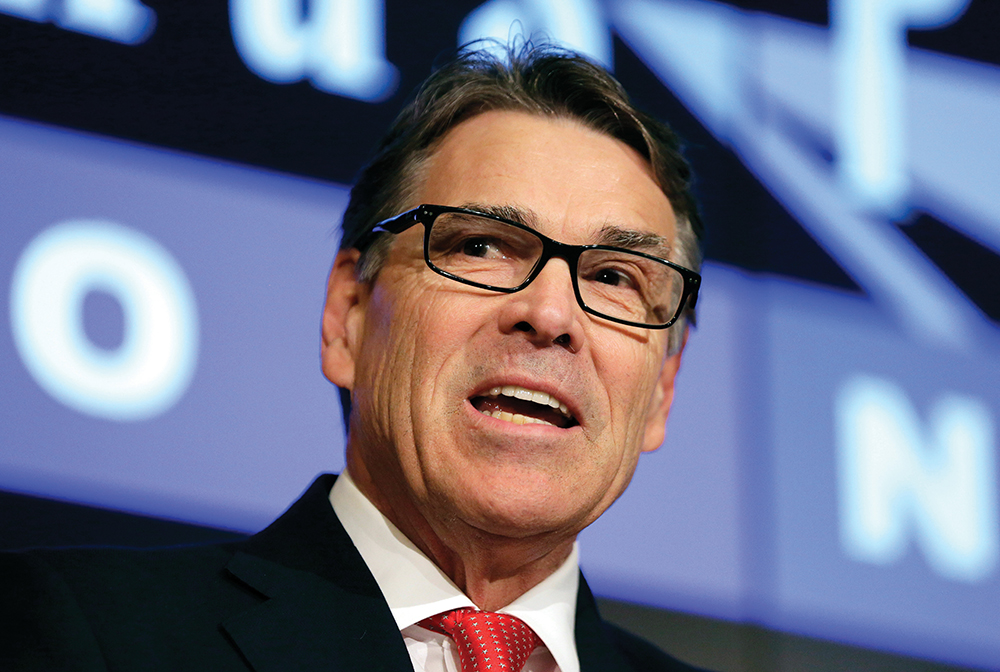
(AP Photos)
Months after calling Donald Trump a “barking carnival act,” it seems Rick Perry’s concerns have vanished.
The former Texas governor has kept busy mending his relationship with the presumptive Republican presidential nominee, assisting an allied super PAC with fundraising and praising the political newcomer’s talent on the campaign trail.
He and Trump have been adamant about addressing the country’s broken immigration system, neither man is keen on political correctness and Perry knows he would bring an impressive resume to the table.
“Perry has all the skills and the experience necessary to be a big help to Trump, and there’s no question that his conservative bona fides would help to bridge the gap between Trump and his conservative skeptics,” said veteran GOP operative Charlie Gerow.
However, Perry’s Texas roots mean he would bring no geographical advantage to the Trump campaign, which has set its sights on the Rust Belt and coastal swing states. He has also pushed back strongly against the type of rhetoric Trump has used to sell his counterterrorism proposals.
“We are not in a war with all people of the Muslim faith by any sense of the imagination,” he said in an interview this April.
“I just don’t think he offers much else besides his experience, and Texas isn’t a major concern,” Republican strategist Susan Del Percio said of Perry. “That’s a Republican state, and if Donald Trump is having problems in a deep red state, this campaign would already be over.”
Chris Christie
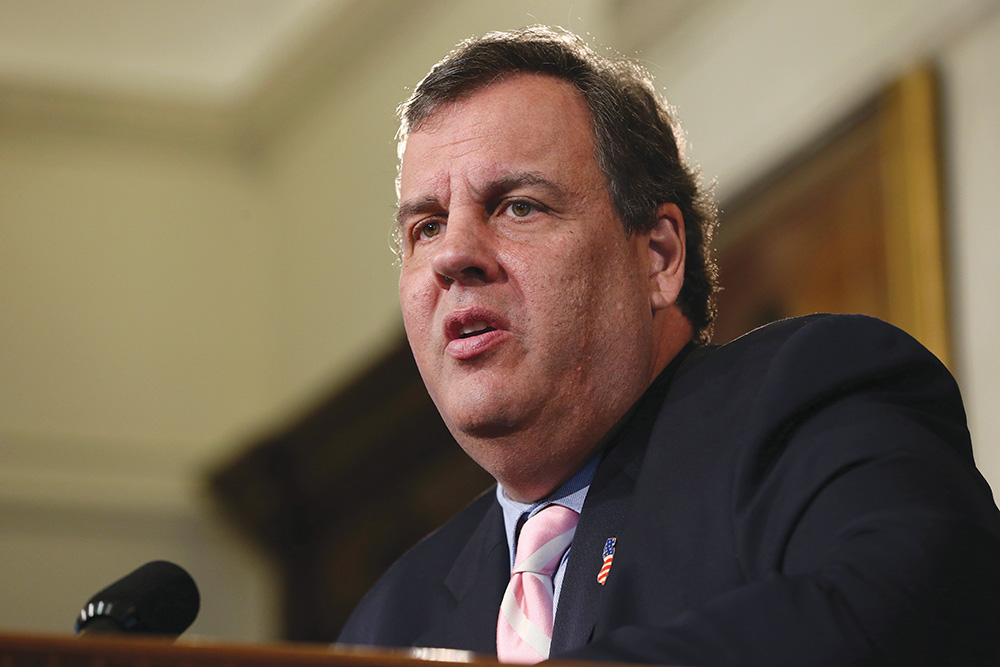
Look no further than the Feb. 6 GOP debate to understand why Chris Christie is one of the most talked about vice presidential possibilities. The New Jersey governor and former federal prosecutor took off his gloves and arguably destroyed Marco Rubio’s presidential ambitions in five minutes.
“Imagine what he could do to Hillary Clinton in five months,” Gerow said.
Combine Christie’s proven ability to deliver sharp rhetorical barbs with his loyalty to Trump, and it’s no wonder a source close to the billionaire’s campaign said the two-term governor is a “top-tier contender for the bottom of the ticket.”
“We’re seeing the presumptive nominees look at running mates that they feel comfortable with, and Donald Trump seems to feel a level of trust here,” Del Percio said, noting that Trump and his wife have a decade-long relationship with Christie. “The last thing his campaign wants is a vice presidential candidate who’s going to go out and make news independent of the candidate.”
But Trump’s fondness of Christie isn’t shared by voters in the New Jersey governor’s home state. Christie has one of the highest unfavorable ratings of any sitting governor and fewer than 20 percent of Garden State residents would support him running as vice president.
Despite his years of experience as a blue-state governor and former U.S. attorney, Christie would do little to help Trump in critical swing states or placate conservatives who find Trump nauseating.
“A Christie candidacy would be focused on personality, not public policy,” Gerow said. “The better option for Trump is choosing someone who can help to unify the party, serve as an effective attack dog [against] Hillary Clinton and bring substantive foreign policy experience to the White House.”
Mike Pence
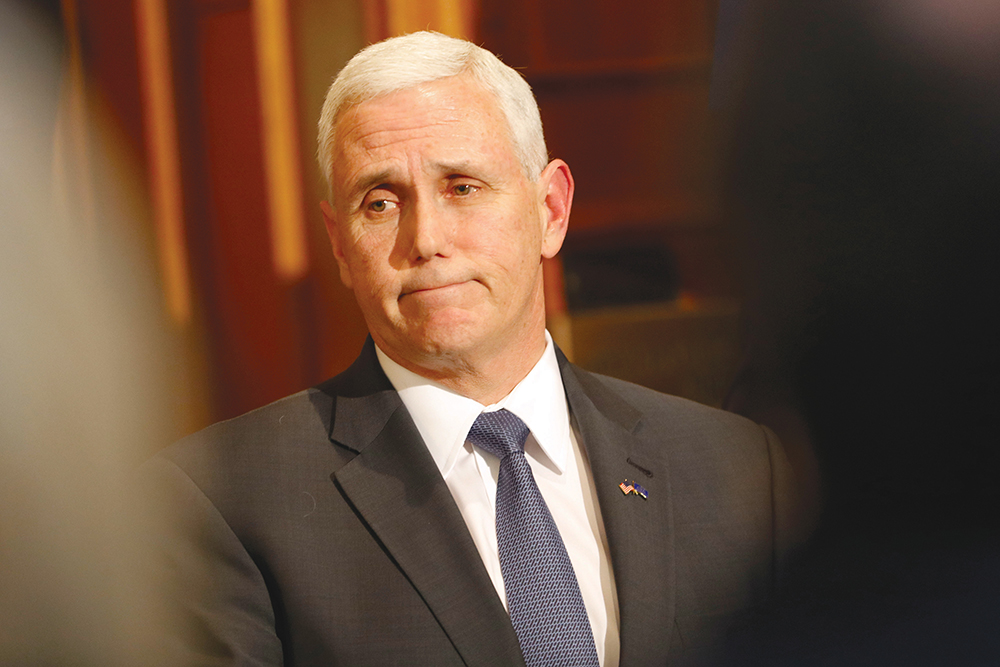
Indiana’s governor may have voted against Donald Trump in the primary, but he could end up on the ticket with Trump in November.
Mike Pence, who previously decided against his own 2016 bid for the White House, said he would vote for Ted Cruz just days before Indiana’s primary, but that does not appear to have hurt him much in Trump’s eyes.
Trump met with Pence and the governor’s family during the July 4 holiday weekend. Marc Lotter, deputy campaign manager of Pence’s re-election bid, said the meeting would be “consistent with meetings Mr. Trump is holding with key party leaders.”
Coming out of the meeting, Pence appeared to improve in Trump’s eyes. Trump tweeted, “Very impressed, great people!” about his meeting with the Pences.
But several logistical hurdles could impede Pence’s path to the vice presidential nomination. Friday, July 15, is the last day for any Indiana gubernatorial candidate to voluntarily withdraw from the general election ballot.
Pence’s vacancy could make it difficult for any Republican to mount a successful election campaign against Democratic challenger John Gregg, who came within striking distance — approximately 4 percentage points — of Pence four years ago.
The Indiana governor also does not appear to bring any constituency into the fold for Trump that the former reality television star has not already attracted. Pence hails from a red state, and his selection would not be seen as an overture to the “Never Trump” crowd or other disaffected Republicans.
Pence’s legislative and executive experience make him a contender for Trump’s running mate, but the bombastic billionaire may be looking for someone who can add votes in crucial places or among key constituencies.
Jeff Sessions
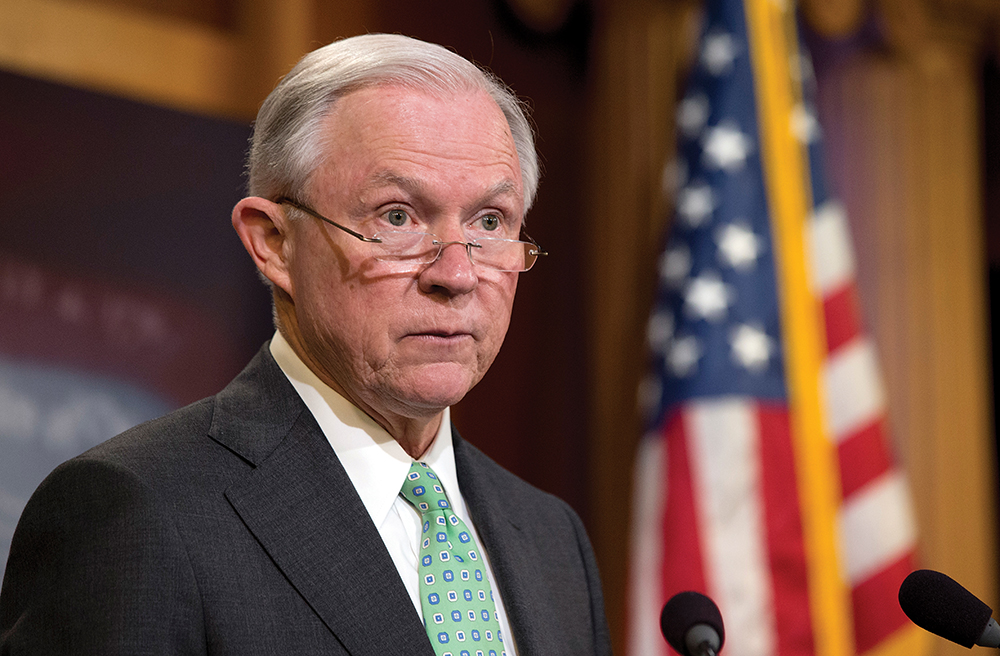
No other elected politician in America may have a policy agenda more similar to Donald Trump than Alabama Sen. Jeff Sessions.
Sessions has tirelessly advocated for restrictionist immigration policies and has opposed various trade deals floated by President Obama. In the GOP primary, Trump borrowed from Sessions liberally and literally, since he snatched former Sessions aide Stephen Miller to work on his policy team.
But Sessions’ support for Trump likely provided more of a boost in the GOP primary than it could in a general election.
Sessions has not faced a competitive opponent in the last 20 years and ran unopposed in his 2014 re-election bid. While Sessions has become an expert at clearing the field in deep-red Crimson Tide country, he may struggle to resonate with fence-sitting independents needed to win in crucial swing states nationwide.
The Alabama senator also fails to clearly add any voting bloc to the Republican ticket that Trump has not already successfully courted. While Trump fans would swoon for Sessions, his selection probably won’t add minority or female voters into the equation, and it’s not easy to see which swing state he could paint red in November.
Sessions is a leading contender for Trump’s vice presidential nod largely because Trump has secured Republican victories by running on a Sessions-inspired agenda. But to win the White House in November, he may choose to look elsewhere. Whatever Trump’s decision, don’t expect Sessions to be too far away from the action this fall.
Mary Fallin
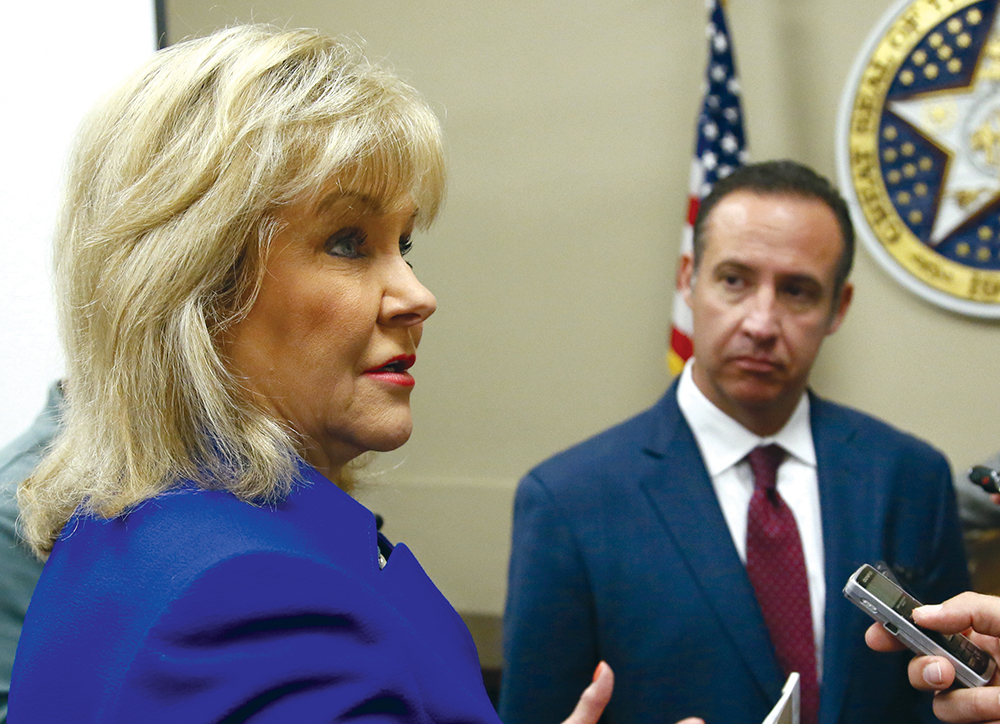
If Donald Trump wants a female foil for Hillary Clinton, he might just pick Oklahoma Gov. Mary Fallin.
Trump paid lip service to the Sooner State’s governor as a running mate in the spring of 2015. After multiple firestorms surrounding Trump’s comments about women benefited his primary opponents, Trump tweeted in April “great job and advice” at a Trump supporter suggesting on CNN that he pick Fallin.
In May, Trump similarly told Fox News he thought Fallin was a “fabulous person” in the context of a potential vice presidential pick.
As the former head of the Republican Governors Association, Fallin would bring political executive experience to the top of the ticket. Fallin has endorsed Trump, but also stumped with Marco Rubio in the primary, meaning she may attract some anti-Trump support from within the Republican Party. And Fallin is the first female governor of Oklahoma who also won re-election by carrying 71 of Oklahoma’s 77 counties.
But a female governor from an already red state may not capture the imagination of independent-leaning voters who could shape the outcome of the election.
Her personal life could also pose a distraction for the GOP. Fallin’s decision to kick her daughter’s trailer off of the governor’s mansion grounds last summer could draw additional scrutiny. Fallin’s daughter lived in a mobile home parked at the governor’s mansion until Fallin decided it was time for her to go lest they run afoul of state regulations.
Newt Gingrich
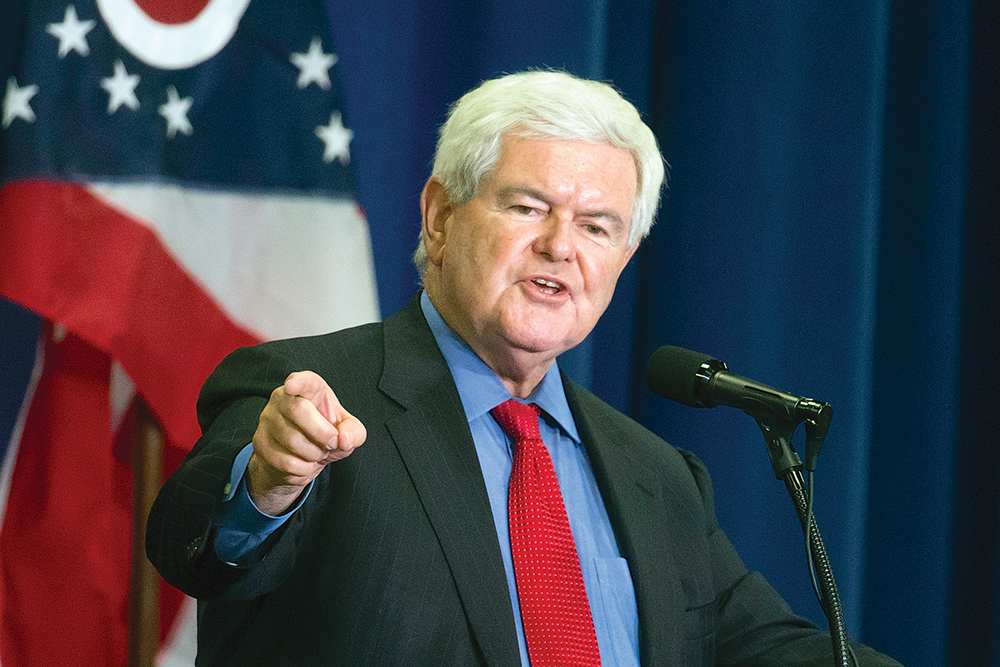
Newt Gingrich could offer Trump a rare opportunity to please both the conservative grassroots of his party and the still-skeptical members of its more traditional wing.
Establishment Republicans still respect Gingrich for the damage he inflicted on the Clintons during his time as House speaker in the 1990s, when he proved himself to be a master of messaging not unlike the top of the GOP ticket he hopes to join.
Conservatives respect Gingrich because he has since built a reputation for challenging the conventional wisdom and the Republican status quo.
A vocal and consistent supporter of Trump’s campaign, Gingrich brings to the table the policy heft Trump lacks and signals to GOP stalwarts that the presumptive nominee is serious about governing well. Gingrich could also help Trump allay conservative concerns about his insufficiently pro-life past.
But for all Gingrich’s attributes, the Georgia Republican represents the party’s old guard in a year driven by the rise of the political outsider. Gingrich’s presence on the ticket could complicate Trump’s argument against bringing back a politician from the 1990s.
Speculation that Gingrich is a leading contender for Trump’s running mate reached a fever pitch when the two appeared at an Ohio rally together on July 6. The former speaker has made virtually every short-list printed by the media, suggesting the Trump campaign is seriously considering Gingrich.
Scott Brown
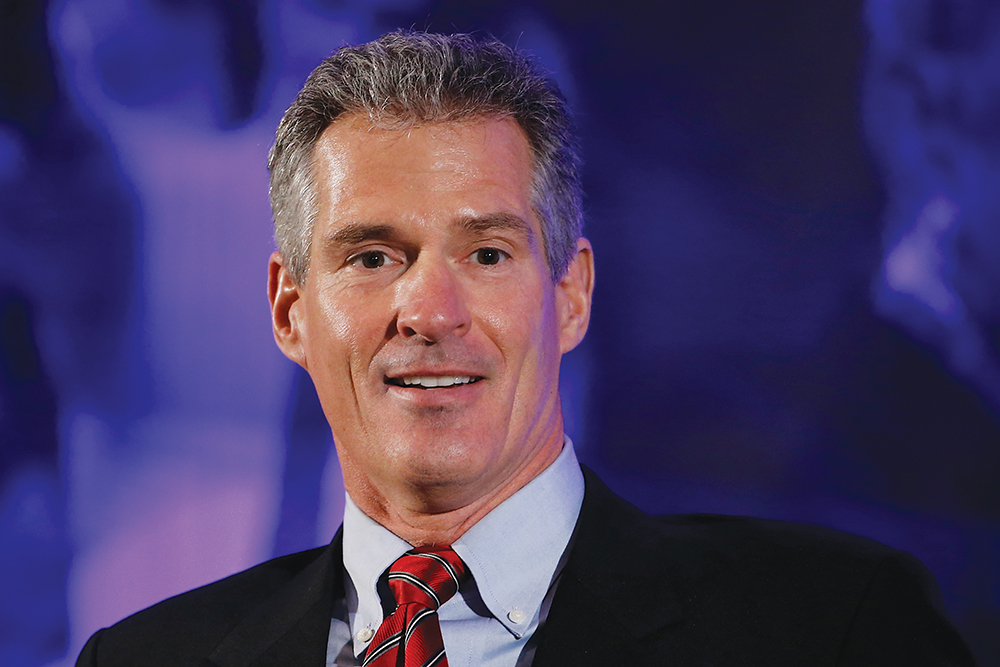
If Trump wants to double down on his pitch to working-class voters, one option could be former Massachusetts Sen. Scott Brown.
Brown has been one of Trump’s more loyal and vocal supporters since endorsing him prior to the New Hampshire primary in February, but also one who could be beneficial as Trump continues to court voters in the Rust Belt and the Midwest.
“Scott is a type of politician who, like Trump, connects well with working Americans. Unlike Trump, who has kind of tapped into this kind of populist streak that has a background as a wealthy businessman, Scott is very identifiable for middle-class Americans,” said Ryan Williams, who served as Mitt Romney’s deputy national press secretary in 2012.
“He lifted himself up by his bootstraps … He has strong blue-collar credentials. He was someone that was counted out in life but managed to wildly exceed expectations,” Williams said. “He could help to reach out to blue-collar Democrats in Rust Belt states that Trump needs to win if he’s going to be president.”
The downside of Brown is experience on the national level, having served only three years in the U.S. Senate before losing a second race two years later in New Hampshire. He also is a regional candidate and doesn’t naturally expand the map for Trump.
If Brown gets the nod and Clinton taps Elizabeth Warren, look out, because the bad blood between the two has persisted four years after she unseated him.
—————-
Hillary Clinton has a somewhat easier task in seeking a running mate, as the Democrats seem to be coalescing ahead of the convention, which starts July 25 in Philadelphia. But she could seek to make inroads with the millions who voted for Bernie Sanders with a progressive pick.
She could also have an eye on replicating the Obama coalition by exciting minority and millennial voters. Or she could target a Democrat from a battleground state she’ll need to win in November.
Here are some options for Clinton:
Elizabeth Warren
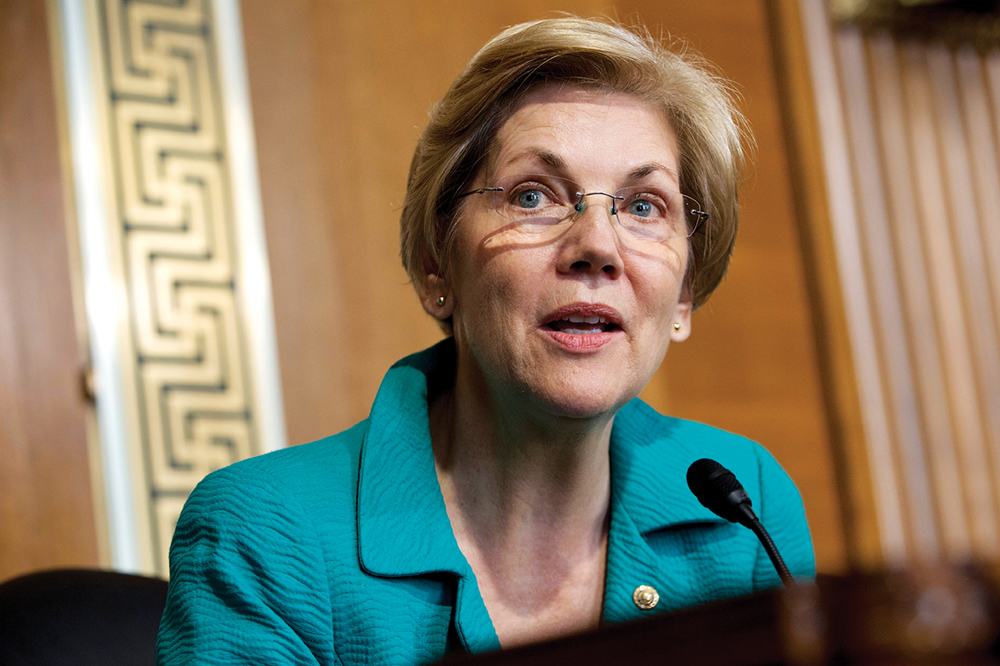
Massachusetts Sen. Elizabeth Warren turned heads during her appearance with Clinton on the campaign trail in late June, upping speculation that the Democrats would chose the liberal icon as her running mate.
“I think there’s been a sense within the party that Warren has kind of been a hero within the progressive movement for years,” a Washington-based Democratic strategist told the Washington Examiner. “I think they’d mesh well — views aren’t that far off from Clinton on the issues they both care about.”
Before Clinton announced her candidacy, the progressive group MoveOn.org encouraged Warren to run for office, and began fundraising for her. Since deciding not to run, Warren declined to endorse Clinton until the day after the final primary.
Since endorsing, Warren has proved to be a valuable attack dog against Trump, providing Clinton with brutal takedowns of the presumptive GOP nominee.
While on stage with Clinton in Cincinnati, Warren called Trump a “a small, insecure money grubber who fights for no one but himself,” and “a nasty man who will never become president of the United States.” She also warned voters to “watch out” as Trump “will crush you in to the dirt to get whatever he wants.”
Warren’s progressive chops could help foster party unity, as her commitments to furthering unions, expanding Social Security and lowering the cost of education may alleviate the concerns of progressives who supported Bernie Sanders.
But if Warren ran with Clinton, Massachusetts Gov. Charlie Baker would have the opportunity to temporarily replace Warren with a Republican senator.
Julian Castro
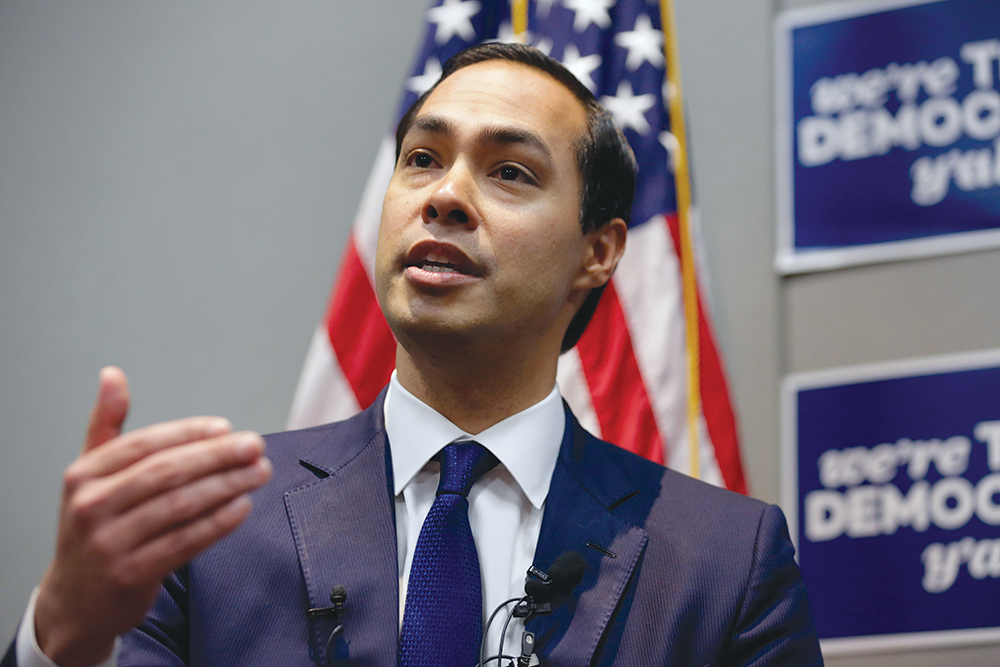
As a young, energetic Latino, Secretary of Housing and Urban Development Julian Castro would help round out the Democratic ticket’s diversity while balancing it out in terms of age.
A native of Texas, Castro appeared early in the primary process as one of the front-runners in the VP search. When Clinton launched Latinos for Hillary in Texas in October, Castro endorsed her. Clinton responded by upping speculation for Castro as her running mate, saying she planned to “really look at him for anything, because he is really good.”
At age 41, Castro could help Clinton turn out the millennial vote in a way the Democratic front-runner has struggled to do. In 2012, Castro delivered the keynote address at the Democratic National Convention in Charlotte, N.C., the same role played by then-Sen. Barack Obama in 2004.
But more important than his youth, Castro would help Clinton get out the Latino vote. Democratic strategist Chuck Rocha, president of Solidarity Strategies, explained that this election will be decided in four swing states with big Latino populations: Colorado, Virginia, Florida and Nevada.
“There are lots of voters who are looking for the next Latino name on the ticket, and Secretary Castro is a good example of the next generation of Latino leaders in America,” Rocha said. “It would be a very inspirational thing to have him on the ticket.”
He added, “Castro is going to look and act a lot like the voters [the Clinton campaign] is trying to get.”
While Castro can help bring out the Latino vote, another Washington-based Democratic strategist explained that because of Trump’s rhetoric about immigrants, “I think the motivation to turn out Latino voters is already really high … They already have a lot of motivation this cycle.”
Tim Kaine
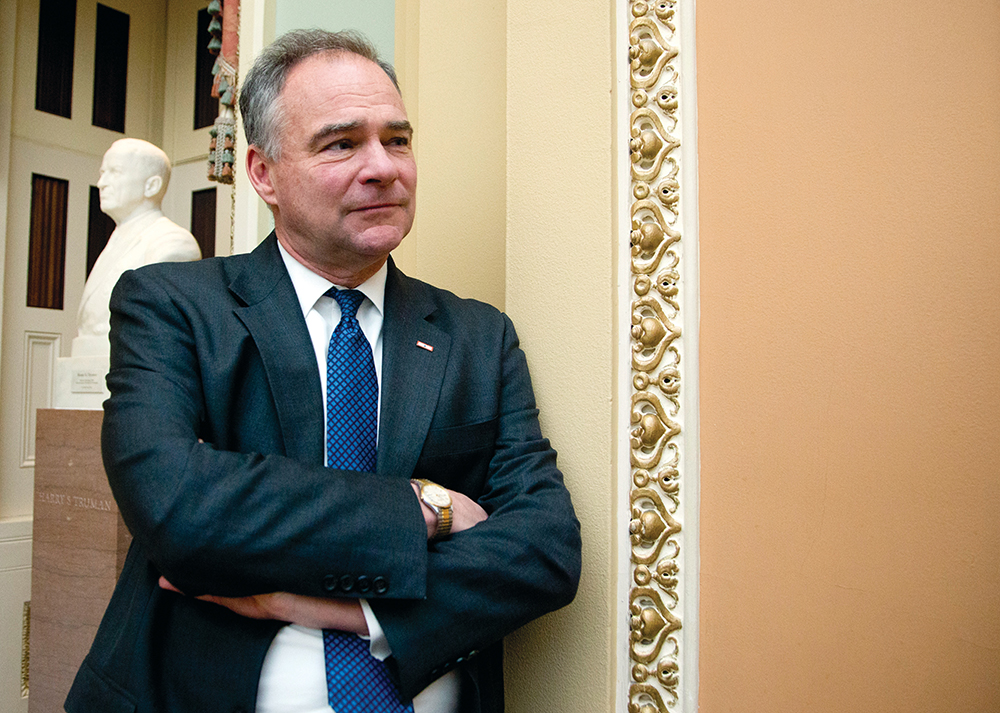
As a former governor of Virginia, Democratic National Committee chairman and current first-term senator, many consider the moderate from Virginia a safe choice for Clinton’s vice president. But Tim Kaine also adds new elements to the ticket by reaching out to both working-class voters and Latinos while carrying a crucial swing state.
Kaine has made only two short appearances on the campaign trail, while Clinton was campaigning in Virginia during the primary. But the senator has been a strong advocate of her candidacy, holding numerous calls with reporters on behalf of the campaign and aiding her Virginia campaign’s efforts.
Kaine would also help Clinton appeal to working-class voters as she competes with Trump for this key demographic. As a native of Minnesota and raised in Missouri, Kaine has repeatedly demonstrated his appeal to blue-collar voters. He may also tamp down Democrats’ claims that Clinton is too hawkish, as he pushed to constrain presidential authority to use military force while in the Senate.
After law school, Kaine spent a year working as a Spanish missionary in Honduras, and speaks Spanish fluently. His proficiency in the language and deep ties to the Virginia Latino community would diversify the campaign.
“His long-tenured connections to the Virginia Latino community could be nicely packaged in any of the other swing states where the Latino vote is important,” Rocha said. “Besides not having a Latino surname, he’s the best choice for the community.”
Sherrod Brown
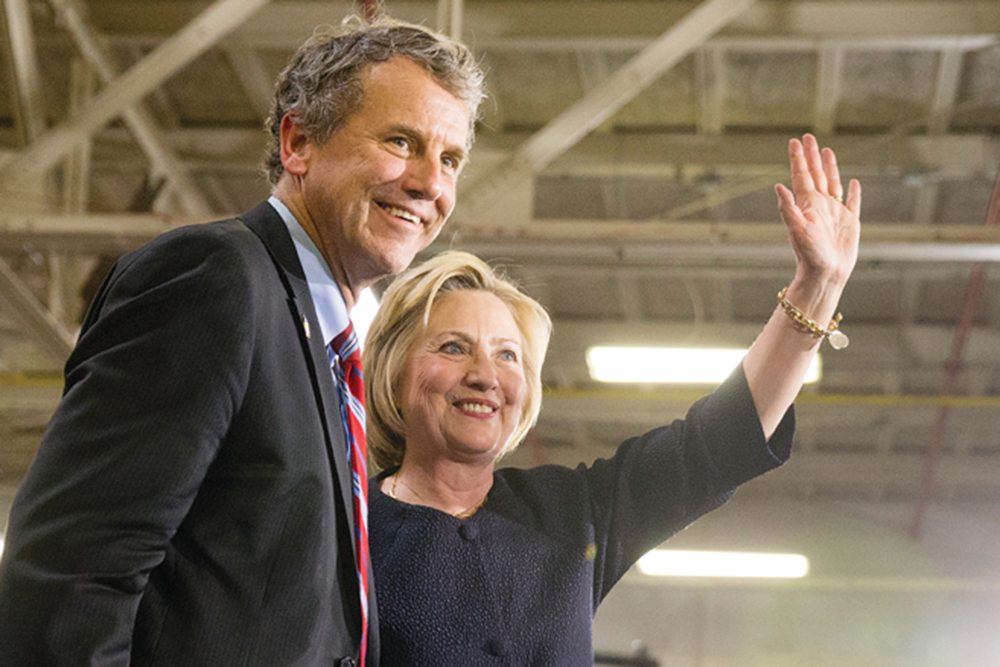
Ohio Sen. Sherrod Brown checks many boxes for the Clinton campaign.
Brown, the senior senator from Ohio, makes a compelling case as a potential running mate. Hailing from the Buckeye State, perhaps the preeminent swing state in the U.S., Brown could help put Ohio in the win column for her. He could also help serve as a bridge for supporters of Bernie Sanders who have not yet crossed over to Clinton.
“Sherrod Brown would be a significant choice. He comes from the Midwest. He’s a populist. He’s slightly on the left. He’s from Ohio, a state she critically needs to win. He can relate to white men, where she has had a real difficulty based upon the publicly released polling data,” said Hank Sheinkopf, a Democratic strategist.
“He can take the hit for her in the Midwest and explain her in a way that she may not have been explained before.”
While Clinton won many demographics during her primary victory over Sanders, white men remained a problem for her throughout, with the Vermont senator being the preferred choice.
However, Brown is one of a few potential vice presidential candidates who hails from a state led by a Republican governor. If Brown were to become Clinton’s running mate and she ends up winning the presidency, he would be forced to resign his seat in the Senate, leaving Gov. John Kasich to temporarily fill the vacancy, something that Brown is not excited about.
“If I were on the ticket and Hillary were to win, that John Kasich would nominate and would appoint my successor, and that bothers me so,” Brown told MSNBC in May.
Mark Warner
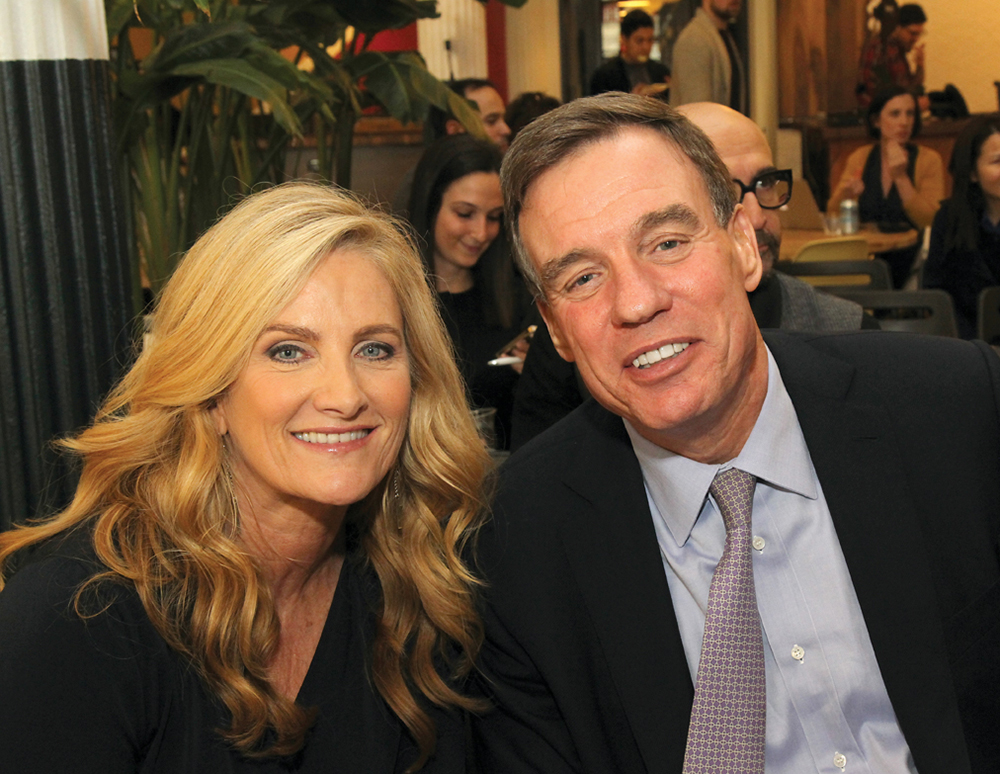
Another possible option for Clinton to look at is another Virginian: Sen. Mark Warner.
A former governor and senator in his second term, Warner could tick off many items that the Clinton campaign will likely look for, namely, serving in a swing state, along with executive experience and a business background.
“He potentially brings Virginia. He potentially brings younger voters, and hopefully he can attract, within the jobs discussion based upon his record as governor before he was a senator, can hopefully talk about jobs and restoring fortunes to the economy,” Sheinkopf said. “He’s an entrepreneur and he brings a profile. And he’s got energy.”
Warner, who was an early investor in Nextel and other technology companies, is the richest member of the U.S. Senate.
“I’m not being vetted. I don’t expect to be vetted,” Warner said in mid-June before praising fellow Virginian Kaine. “There’s nobody with better integrity and trustfulness … Secretary Clinton and the country would do well by him.”
He also won’t shy away from the spotlight and knows how to deliver a big speech, having served as the keynote speaker during the 2008 Democratic National Convention in Colorado.
Tom Perez
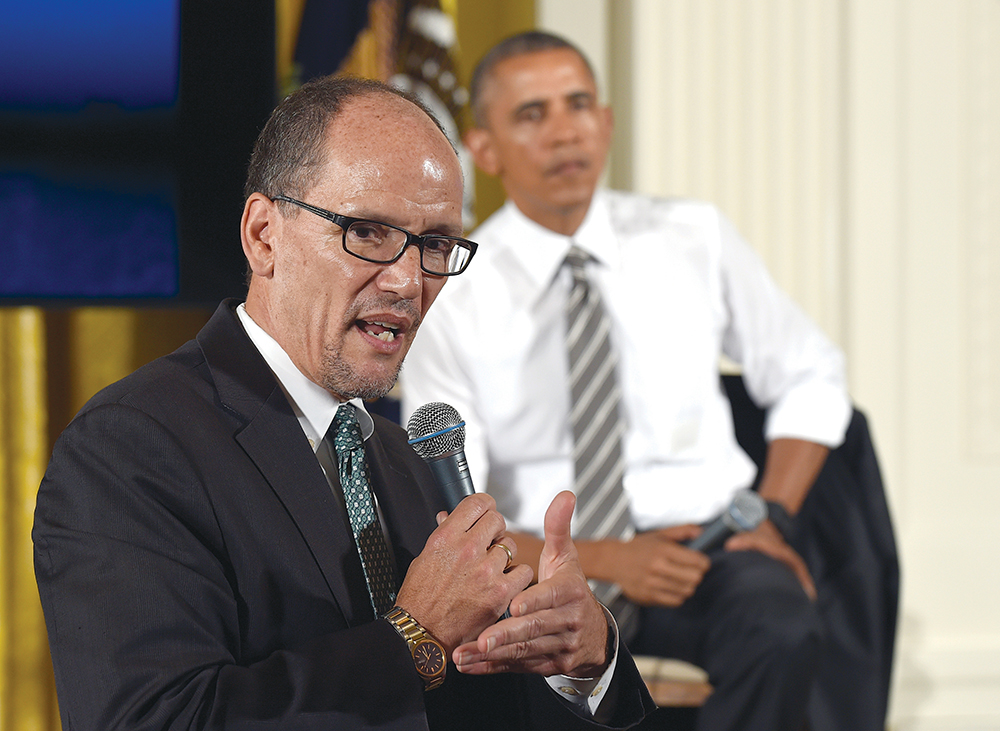
Labor Secretary Tom Perez is a well-liked progressive who could serve as an olive branch to Sanders supporters as they weigh whether to back Clinton now that their preferred candidate is finished.
As a prominent Hispanic, Perez could help Clinton double down on a group she already hopes to win by highlighting her Republican opponent’s hostile rhetoric toward Latinos.
His experience working on civil rights at the Justice Department dovetails nicely with Clinton’s pledge to empower the African-American community, and his tenure atop the Department of Labor has focused on issues central to the presumptive Democratic nominee’s campaign pitch to the middle class, such as union rights and paid leave advocacy.
Perez endorsed Clinton long before the Iowa caucuses, proving himself a loyal surrogate by campaigning for the former secretary of state and frequently defending her in media appearances.
But the Cabinet secretary is relatively untested on the national stage. Perez is less well-known than other potential progressive picks and could complicate any effort by Clinton to pivot back to the center after shifting left to compensate for Sanders’ surprising popularity.
Cory Booker
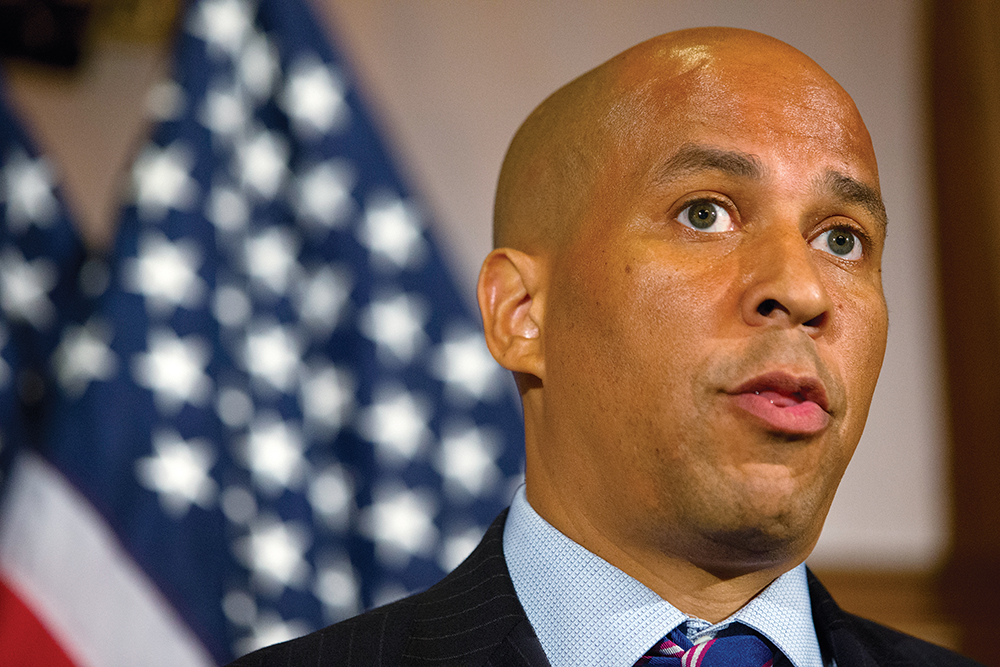
Clinton could potentially tap the freshman senator from New Jersey and former mayor of Newark, Cory Booker. He is popular with both progressives and centrists. He has also demonstrated an ability to work across the aisle.
Booker is relatively young at 47 and African-American. Younger and black voters are two key constituencies who went to the polls in high numbers to vote for Barack Obama. Why just rely on anti-Trump sentiment to turn them out this November?
At a joint appearance in the Garden State, Booker did appear somewhat over-eager. “I hate to contradict Bon Jovi but, dear God, Hillary Clinton you give love a good name,” he said, quoting the legendary New Jersey rocker. “I’m already her VP,” he joked in response to a question. “Her vegan pal.”
Comedy aside, Booker is considered a serious lawmaker. As the Democratic base gets younger and more diverse, it wouldn’t hurt Clinton to add a running mate who reflects those two traits. And if Trump were to pick Christie, there could be some interesting New Jersey feuding with a Clinton-Booker ticket.
Al Weaver, Ariel Cohen, Gabby Morrongiello, Ryan Lovelace, Sarah Westwood and W. James Antle III contributed to this report.
